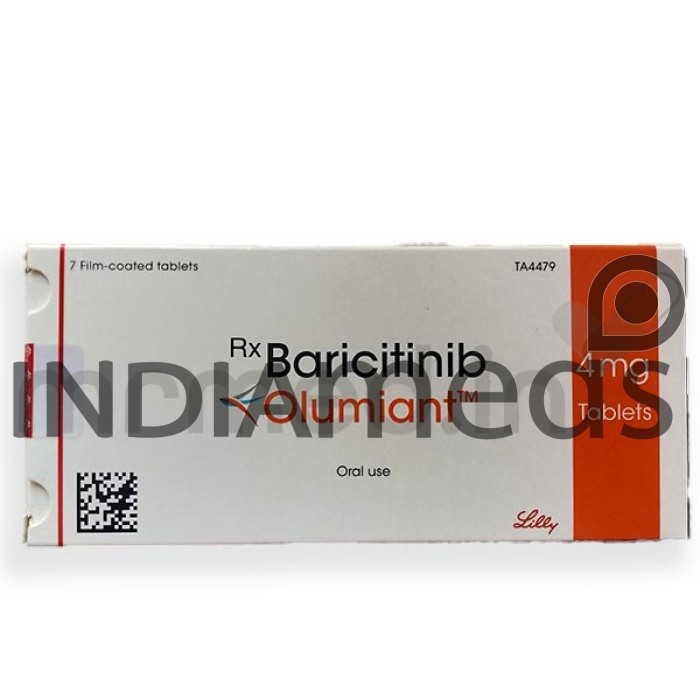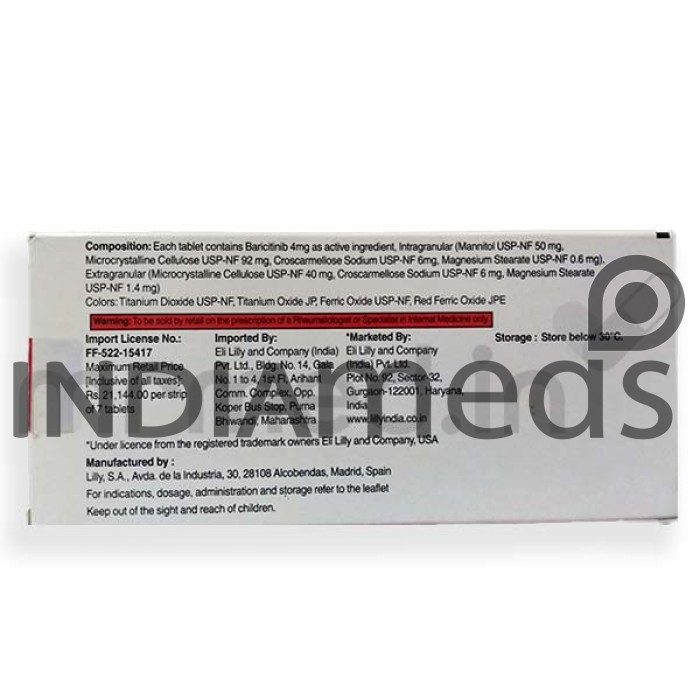Olumiant 4mg tablet contains an active component such as Baricitinib. It belongs to a class of drugs known as Janus kinase (JAK) inhibitors. It is primarily used to treat certain autoimmune conditions, particularly rheumatoid arthritis, a chronic autoimmune disorder that primarily affects the joints. This can enhance their quality of life and ability to perform daily activities. This can lead to a reduction in pain, swelling, and stiffness associated with rheumatoid arthritis. It is approved for use in cases where patients have not responded well to conventional disease-modifying antirheumatic drugs (DMARDs) or other treatments. It helps to reduce inflammation and manage the symptoms associated with rheumatoid arthritis. Additionally, during the COVID-19 pandemic, there was some interest in using this medication as a potential treatment for severe cases of COVID-19.
Individuals with known hypersensitivity (allergic reaction) to Olumiant 4mg tablet or any of its components should not use the medication. It should not be used in individuals with active serious infections, including tuberculosis, bacterial, fungal, or viral infections. This medication can affect the immune system's response to vaccines; it is generally not recommended to receive live vaccines while taking this medication. Olumiant 4mg tablet's safety and efficacy have not been established in pediatric patients under 18, so it is not typically used in this age group. Older adults often have a higher chance of having multiple medical conditions and taking multiple medications simultaneously, so it is necessary to consult a doctor before taking this medication.
- Rheumatoid arthritis treatment
- Autoimmune condition management
- Combination therapy for rheumatoid arthritis
- Investigational use in COVID-19
- Immunosuppressive effects
Therapeutic Effects of Olumiant 4mg Tablet
Pregnancy
It is important to discuss your pregnancy status with your healthcare provider before starting Olumiant 4mg tablet, as its safety in pregnancy is not well-established.
Breast Feeding
The safety of Olumiant 4mg tablet during breastfeeding is uncertain. It's recommended to consult a healthcare provider before using the medication while breastfeeding.
Lungs
Olumiant 4mg tablet can increase the risk of respiratory infections. If you have a history of lung issues, discuss the potential risks and benefits with your healthcare provider.
Liver
Olumiant 4mg tablet is metabolized by the liver, so individuals with severe liver disease should consult a healthcare provider before starting this medication.
Alcohol
Alcohol consumption might increase the risk of side effects like dizziness and lightheadedness. It is safe to take alcohol while using Olumiant 4mg tablet.
Driving
Taking Olumiant 4mg tablet while driving is unsafe as it can cause dizziness or drowsiness.
Serious
- Serious infections
- Blood clots
- Malignancies
- Gastrointestinal perforations
- Liver abnormalities
Common
- Upper respiratory tract infections
- Headache
- Increased liver enzymes
- High blood pressure
- Changes in blood cell counts
- Elevated cholesterol levels
Olumiant 4mg tablet may increase the risk of serious infections. Tuberculosis (TB) should be ruled out before starting treatment.
Yes, Olumiant 4mg tablet may increase the risk of blood clots, particularly in individuals at higher risk. Close monitoring is recommended.
The onset of improvement can vary. Some individuals may experience symptom relief within weeks, while others might take longer to respond.
No, following your healthcare provider's instructions is important, and not discontinuing Olumiant 4mg tablet without consulting them, even if your symptoms improve.
Stopping Olumiant 4mg tablet should be discussed with your healthcare provider to avoid potential flare-ups of your condition.
Yes, mood changes and depression have been reported with Olumiant 4mg tablet. Monitor mental health and seek help if needed.
Molecule name: Baricitinib | Therapeutic class: Disease-modifying antirheumatic drugs |
Pharmacological class: Janus kinase (JAK) inhibitor | Indications: 1. Rheumatoid arthritis treatment 2. Autoimmune condition management 3. Combination therapy for rheumatoid arthritis 4. Investigational use in COVID-19 5. Immunosuppressive effects |





